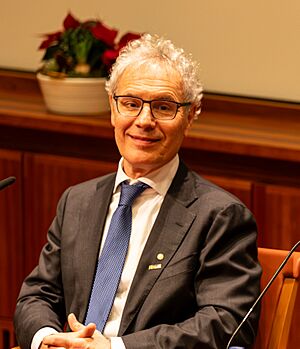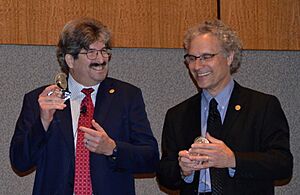Victor Ambros facts for kids
Quick facts for kids
Victor Ambros
|
|
|---|---|

Ambros in 2024
|
|
| Born | December 1, 1953 Hanover, New Hampshire, U.S.
|
| Alma mater | Massachusetts Institute of Technology (BS, PhD) |
| Known for | Discovery of microRNA |
| Awards |
|
| Scientific career | |
| Fields | Biology |
| Institutions | M.I.T. Center for Cancer Research (1975–1976) Massachusetts Institute of Technology (1976–1979) Harvard University (1985–1992) Dartmouth College (1992–2001) Dartmouth Medical School (2001–2007) University of Massachusetts Medical School (2008–) |
| Thesis | The protein covalently linked to the 5'-end of poliovirus RNA (1979) |
| Doctoral advisor | David Baltimore |
Victor R. Ambros, born on December 1, 1953, is an American scientist. He is famous for discovering the very first microRNA (miRNA). These are tiny molecules that play a big role in how living things grow. He works as a professor at the University of Massachusetts Medical School. He studied and earned his degrees at the Massachusetts Institute of Technology (MIT). In 2024, he won the Nobel Prize in Physiology or Medicine. This award was for his amazing work on microRNA.
Contents
Meet Victor Ambros
Growing Up and Learning
Victor Ambros was born in New Hampshire, USA. His father, Longin Ambros, was a Polish refugee from World War II. Victor grew up on a small dairy farm in Hartland, Vermont. He was one of eight children in his family. He went to Woodstock Union High School.
After high school, Ambros went to the Massachusetts Institute of Technology (MIT). He earned his Bachelor of Science degree in biology in 1975. He then continued his studies at MIT. In 1979, he received his Doctor of Philosophy (PhD) in biology. His PhD advisor was David Baltimore. Baltimore himself had won a Nobel Prize in 1975. Ambros also did important research with another future Nobel winner, H. Robert Horvitz.
His Career Journey
In 1984, Victor Ambros became a professor at Harvard University. However, Harvard did not offer him a permanent position. This happened shortly after he made his big discovery about microRNA. Later, David Baltimore said that Harvard missed out on a future Nobel winner. He explained that big discoveries often seem important only after they are made.
In 1992, Ambros joined Dartmouth College. Then, in 2008, he moved to the University of Massachusetts Medical School. Today, he is known as the Silverman Professor of Natural Sciences. This special title was created by one of his former students.
Amazing Discoveries in Science
In 1993, Victor Ambros and his team made a huge discovery. They found tiny RNA molecules in a worm called C. elegans. These molecules were special because they did not make proteins. Instead, they helped control how the worm developed.
Scientists already knew that a gene called lin-4 was important for the worm's growth. If lin-4 didn't work, the worm's development was off. Ambros and his colleagues found that lin-4 didn't make a protein. Instead, it made small RNA pieces. They called these lin-4S (short) and lin-4L (long).
They learned that lin-4S could connect to another molecule. This molecule was part of the instructions for making a protein called LIN-14. Ambros and his team figured out that lin-4S controlled how much LIN-14 protein was made. This was a new way that genes could be controlled.
Later, in 2000, another small RNA molecule was found in C. elegans. It was called let-7. Scientists discovered that let-7 was found in many different animals, even humans. These discoveries proved that Ambros had found a whole new group of tiny RNAs. Today, we call them microRNA. They are very important for how all living things grow and function.
In 2007, Victor Ambros was chosen to join the United States National Academy of Sciences. This is a very high honor for scientists. In 2011, he became a Fellow of the American Academy of Arts and Sciences. In 2024, he shared the Nobel Prize with Gary Ruvkun. They won for finding microRNA and understanding how it controls genes.
Awards and Honors

Victor Ambros has received many important awards for his scientific work:
- 2002: Newcomb Cleveland Prize
- 2004: Lewis S. Rosenstiel Award
- 2006: Genetics Society of America Medal
- 2007: Elected to the National Academy of Sciences
- 2008: Gairdner Foundation International Award
- 2008: Benjamin Franklin Medal in Life Science
- 2008: Albert Lasker Award for Basic Medical Research
- 2008: Massachusetts General Hospital Warren Triennial Prize
- 2009: Dickson Prize in medicine
- 2009: Louisa Gross Horwitz Prize
- 2009: Massry Prize
- 2012: Dr. Paul Janssen Award for Biomedical Research
- 2013: Keio Medical Science Prize
- 2014: Gruber Prize in Genetics
- 2014: Wolf Prize in Medicine
- 2015: Breakthrough Prize in Life Sciences
- 2016: March of Dimes Prize in Developmental Biology
- 2024: Nobel Prize in Physiology or Medicine
See also
 In Spanish: Victor Ambros para niños
In Spanish: Victor Ambros para niños
 | Claudette Colvin |
 | Myrlie Evers-Williams |
 | Alberta Odell Jones |

